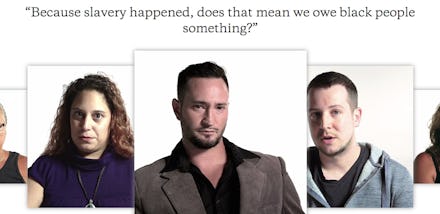White People Are Unironically Talking About the White Experience in New PBS Documentary

The news: This week, PBS and documentary filmmaker Whitney Dow launched the first installment of the "Whiteness Project," a thorough and well-intentioned interview series that aims to make white Americans open up about their racial identities.
Dow started his goal to interview 1,000 white Americans across the country to obtain their unfiltered views on race. The first 24 of those one-minute interviews from Buffalo, New York, are now available on the PBS website.
And so far, Dow has delivered. The interviews are sharp, engaging and relevant, precisely because they don't aspire to show a saccharine view of racial problems in America. Instead, they're revealing just how tense racial relations in the U.S. are right now and how many white people simply don't know how to talk about it. Many of them are contributing to it.
Such as: Take Harold, who tells Dow that he thinks whites in his area have more pride in their racial identity than "other races" and says he was discriminated against in hiring because of his race. He wishes the country was capable of having deeper conversations on race.
Or Rich, who blames the "black community" for not supporting each other.
Then there's the "color-blind" white people like Michael, who says "your color means absolutely nothing to me" and "doesn't buy into the nonsense about discrimination."
Deanna fears black men who follow her inappropriately.
Kathie says that "people are people" and that whiteness confers no benefits in America.
Other white Americans express more nuanced views. Robert says he's against affirmative action because he thinks people should make "their own way in life," pointing to the time when he had to compete against three equally well-qualified black women for a job. He claims to have had ancestors sold into white slavery.
Claudia relays her fear of stepping on racial "eggshells" like fried chicken and Kool-Aid.
John says he was made painfully aware of his whiteness when he was thrown into a prison contested by Native American and black prisoners.
Ken, whose grandfather was a Native American, says he checks that box on the census because ignoring his ancestors' struggles would be a "crime."
Chris talks about Buffalo's rampant racial segregation.
The reaction was not kind. Critics like the Daily Dot's Miles Klee claimed most of the white people spent their time in the spotlight "criticizing minorities." In some cases, Klee argues, the videos could "easily be mistaken for satire where it not for the involvement of PBS."
But if you want an honest look at how America's white people think about themselves, define their racial identities and interact those of different backgrounds, the Whiteness Project offers some invaluable insights.
Insights like this, perhaps:
The Whiteness Project could be interpreted as a way for whites with noxious views on race to advance their hegemony on public discourse, but it's not. All Dow is doing is putting a camera in front of white folks and asking them to elaborate on their opinions, relaying the perceived inability of white Americans to grapple with racial issues in a sincere and up-front manner.
Provocative and unsettling, the Whiteness Project is straight from the horse's mouth, which, for better or worse, is more telling than you might imagine.